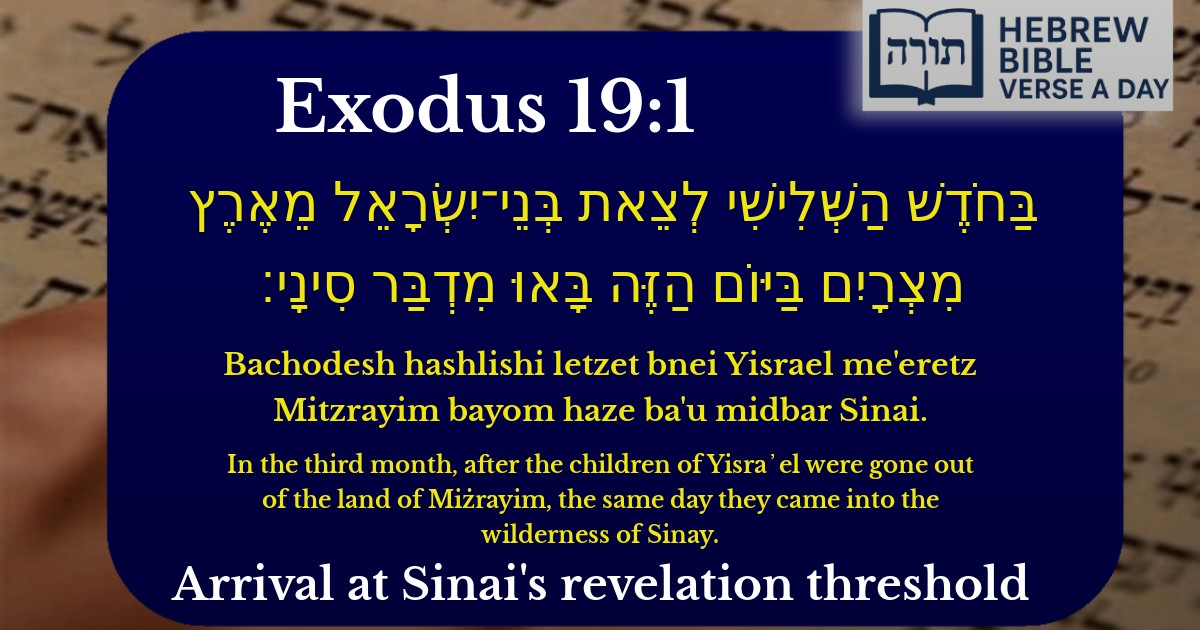Join Our Newsletter To Be Informed When New Videos Are Posted
Join the thousands of fellow Studends who rely on our videos to learn how to read the bible in Hebrew for free!
Hebrew Text
בַּחֹדֶשׁ הַשְּׁלִישִׁי לְצֵאת בְּנֵי־יִשְׂרָאֵל מֵאֶרֶץ מִצְרָיִם בַּיּוֹם הַזֶּה בָּאוּ מִדְבַּר סִינָי׃
English Translation
In the third month, after the children of Yisra᾽el were gone out of the land of Miżrayim, the same day they came into the wilderness of Sinay.
Transliteration
Bachodesh hashlishi letzet bnei Yisrael me'eretz Mitzrayim bayom haze ba'u midbar Sinai.
Hebrew Leining Text
בַּחֹ֙דֶשׁ֙ הַשְּׁלִישִׁ֔י לְצֵ֥את בְּנֵי־יִשְׂרָאֵ֖ל מֵאֶ֣רֶץ מִצְרָ֑יִם בַּיּ֣וֹם הַזֶּ֔ה בָּ֖אוּ מִדְבַּ֥ר סִינָֽי׃
בַּחֹ֙דֶשׁ֙ הַשְּׁלִישִׁ֔י לְצֵ֥את בְּנֵי־יִשְׂרָאֵ֖ל מֵאֶ֣רֶץ מִצְרָ֑יִם בַּיּ֣וֹם הַזֶּ֔ה בָּ֖אוּ מִדְבַּ֥ר סִינָֽי׃
🎵 Listen to leining
Parasha Commentary
📚 Talmud Citations
This verse is quoted in the Talmud.
📖 Shabbat 86b
The verse is referenced in a discussion about the timing of the giving of the Torah at Mount Sinai, specifically debating whether it occurred on the 6th or 7th of Sivan.
📖 Megillah 31a
The verse is mentioned in the context of the reading of the Torah portion that includes the revelation at Sinai during the festival of Shavuot.


Timing of the Arrival at Sinai
The verse states that Bnei Yisrael arrived at the wilderness of Sinai in the third month after leaving Egypt. Rashi (Shemot 19:1) notes that this was the month of Sivan, emphasizing the precision of the timeline—exactly on Rosh Chodesh Sivan. The Mechilta (Yitro, Massekhta DeBaChodesh 1) elaborates that this timing was divinely orchestrated to prepare them for receiving the Torah, showing that their journey was not random but directed by Hashem's plan.
Significance of the Third Month
Ramban (Shemot 19:1) explains that the "third month" holds symbolic meaning. Just as a mikveh requires three stages of immersion for purification, Bnei Yisrael underwent three stages of preparation:
The Wilderness as a Place of Revelation
The Midrash Tanchuma (Yitro 8) teaches that the Torah was given in the wilderness to signify that it is free and accessible to all who seek it, just as a desert is ownerless. The Seforno (Shemot 19:1) adds that the barrenness of the desert represents humility, a prerequisite for accepting the Torah.
The Phrase "On This Day"
The Talmud (Shabbat 86b) derives from the words "בַּיּוֹם הַזֶּה" ("on this day") that the Torah should always feel as fresh and new as if it were given today. The Kli Yakar (Shemot 19:1) expands on this, explaining that the immediacy of "this day" teaches that Torah study must be approached with constant renewal and enthusiasm, not as a stale or outdated obligation.